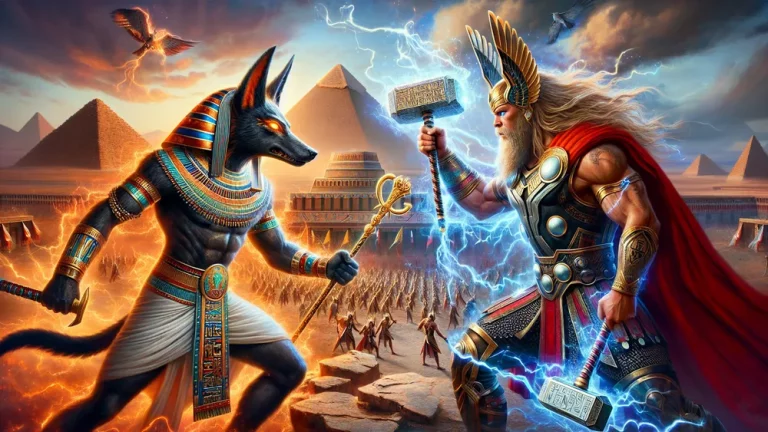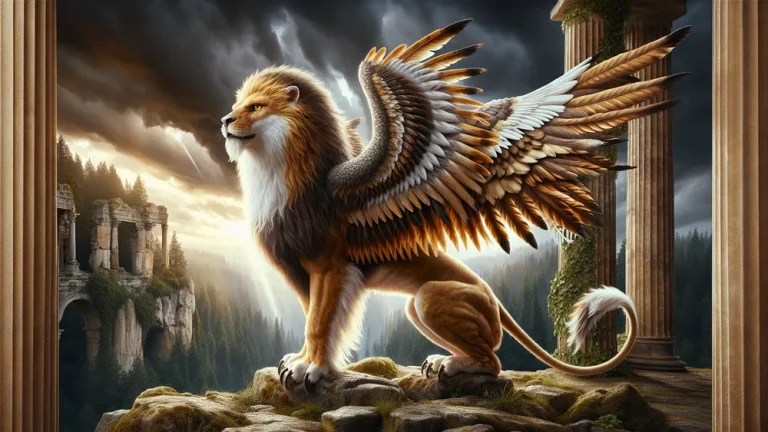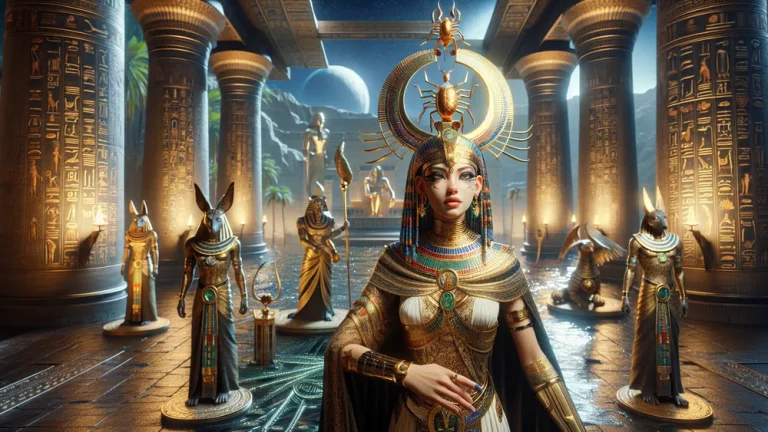Aeolus: Greek Mythology’s God And King Of The Winds
In the colorful world of Greek myths, Aeolus comes as an interesting person who manages the winds. Before getting into this, you should know that Greek mythology is full of different stories and complex tales, and what Aeolus is all about is not different.
Key Points:
- Aeolus is the god and king of the winds in Greek mythology, controlling Boreas, Notus, Zephyrus, and Eurus.
- His home is Aeolia, a mythical floating island, associated with managing the winds.
- Aeolus appears both as a human king or a god, reflecting Greek myths’ flexibility.
- In The Odyssey, Aeolus helps Odysseus by offering a bag of winds but doesn’t help a second time.
- In Roman stories like The Aeneid, Aeolus aids Juno by unleashing storms against Aeneas.
- Aeolus’s myths symbolize people’s efforts to control and harmonize with nature.
- His children, like Sisyphus and Athamas, connect him to important Greek tales.
He is usually seen as the chief of the winds, and you might think of him like someone who leads a group, where each wind – just like an instrument – has its own part under his direction.
His tale appears in different old stories, sometimes letting us see him as a regular king and other times as a god-like figure given unusual power over the wild parts of nature. Much like a weatherman today who tries to guess and handle weather patterns, Aeolus’s legend covers the never-ending human interest in nature’s wild forces.
Whether he is in Homer’s “The Odyssey” or Virgil’s “The Aeneid,” the tales around Aeolus paint a scene of a person who is both admired and strange. This part sets up a closer look at the interesting roles, stories, and meaning tied to Aeolus through the years.
Aeolus: Overview and Key Facts
| Key Fact | Description |
|---|---|
| Title | God and King of the Winds |
| Family Background | Sometimes mentioned as Hippotes’s son; other stories might say different, which means his origins are unclear |
| Where he lives | Aeolia, a storybook floating island in the Tyrrhenian Sea; though it can appear differently in various old writings |
| Symbolism | His role means control over winds, showing the larger idea of people trying to use nature’s wild power |
| Main Traits | Power over Winds including the North (Boreas), West (Zephyrus), South (Notus), and East (Eurus) Winds |
| Role in Stories | Prominent in “The Odyssey” by Homer, where he helps Odysseus by giving him good winds; he also appears in Roman stories, like Virgil’s “The Aeneid” |
| Connected Gods | Ties with gods like Poseidon and Oceanids, meaning the Greek gods are all linked together |
| Impact on Culture | His story means common ideas in old Greek life, such as sea travel’s importance and winds in farming and sailing |
| Changes | How he is shown varies with the tale or cultural viewpoint, sometimes as a god, other times like a normal man, showing the playful nature in Greek stories |
Who is Aeolus?
To get Aeolus’s complex part in Greek mythology, it means we should look more at his duties, family background, and the lasting stories that made his name last.
Aeolus: The Guy in Charge of the Winds
In the rich world of Greek myths, Aeolus is seen as the well-respected master of the winds, which gives him a lot of responsibilities. He mainly looks after the Anemii – the winds like Boreas (North), Notus (South), Zephyrus (West), and Eurus (East). Think of Aeolus as someone who directs traffic, moving the big air streams over sky and sea, making him huge in both god and human areas.
Sometimes he seems like a divine figure, other times more like a lucky human trusted with this job. These different stories mean Greek myths are complex and layered.
His home is the storybook island of Aeolia, and it means his rule over the winds. It pops up in his tales and might float or be tied to real places, depending on the story. He handles the winds not just to control them, but keeping nature in balance. These ideas link to today’s views on managing the environment, like working with nature rather than fighting it. In Greek and Roman stories, his role is clear because the winds often act in key parts. Here’s what Aeolus does:
- Watches over the winds: Boreas, Notus, Zephyrus, and Eurus.
- Lives on Aeolia, which ties his story to places and power ideas.
- Changes stories and nature, showing importance.
These ideas illustrate that Aeolus as the wind’s caretaker keeps him important in myths.
In the world of Greek myths, Aeolus stands out as the wind’s caretaker, watching over major winds like Boreas and Notus, symbolizing how myths value his role in balancing nature.
Aeolus’ Family Background and Relatives
The mix of Aeolus’s family is a complicated and varied one in Greek stories, which means there are many family ties defining their world. Often, he is Hippotes’s son, putting him in family lines seen in old writings. Yet, stories change, some saying different ancestors, which indicates the flexible nature of myths as tales shift over time.
Think of his lineage as a tree with twisting branches, connecting paths that join with other story characters. This not only means complexity but also how family links work, offering views on how Aeolus is part of the larger divine story. Moreover, his close family includes his children and other relatives in various stories.
For instance, some tales say his kids are Sisyphus, Athamas, and Salmoneus, tying him to key myths. These children matter to the story world, often meaning themes of human effort and mistakes. Picture his family like a web, where each thread connects different tales and people across Greek myths, showing how Aeolus’s reach goes beyond his own story.

These links make clear how deep Aeolus’s role is in the myth world, where family ties are not just names – they’re key parts of a bigger story of gods, humans, and their world.
The Story of Aeolus and Odysseus
The meeting between Aeolus and Odysseus is one of the most interesting parts of “The Odyssey” by Homer. It means an essential moment in Odysseus’s tough trip back from the Trojan War. Aeolus, who is in charge of the winds, lives on Aeolia, an island that moves. Odysseus and his men rest there after a difficult time at sea.
Aeolus understands their journey and helps them by calming the winds. He gives Odysseus a bag with all the bad winds locked inside. This creates calm seas for traveling to Ithaca. This act points out Aeolus’s big role in balancing wild nature with what humans want. Despite Aeolus’s kind help, the trip changes because of Odysseus’s crew’s curiosity and mistrust. Near Ithaca, with home close, Odysseus sleeps.
His crew thinks the bag has treasures hidden by him. They open it out of greed and doubts, releasing the winds, and pushing them off course. This part of the myth teaches about human nature, trust, and what happens with ignorance and greed. Aeolus’s first act of kindness turns into a warning about how fragile luck is, a theme in many Greek stories where pride or lack of communication causes problems.

When Odysseus comes back to Aeolia to ask for help again, Aeolus says no. He thinks these issues mean the gods are angry. This meeting highlights the limits of asking gods for help repeatedly. Unlike other gods who might keep helping or punishing, Aeolus steps back after he helps once. This introduces ideas of doing things oneself and bearing results.
Aeolus’s refusal means it is important to take chances when given and deal with outcomes. This reflects personal responsibility in Greek myths – between destiny and individual choices – and is clearly seen in Aeolus and Odysseus’s meeting, leaving lasting lessons on what people are like.
Aeolus: Ruler of Aeolia
They say Aeolus rules over the mythical island called Aeolia, a place filled with mysterious and magical features found in Greek myths. Often described in stories as floating or placed far in the Mediterranean, it makes sense as the home for the one who handles the winds. This independent spot, sometimes like a well-placed weather station, is well-suited for Aeolus. It lets him control the air forces that move around the Greek lands. An island that floats or sits far away means the need for control and distance to rule such strong forces of nature. Aeolus’s important place in stories is clear. However, the unclear location or setup of Aeolia means flexibility in myths, where places fit the story instead of true geography. Think of Aeolia in these terms:
| Feature | Description |
|---|---|
| Location | Changes in stories; often shown as remote or floating; sometimes thought to be part of the Mediterranean |
| Role | Home for Aeolus and the Anemii; important for wind management |
| Mythological Significance | Means balance and control over natural forces; a place of safety and strategy |
In this unusual place, Aeolus rules, making sure the winds are used and kept in as needed. His role is crucial in the travels and stories woven into Greek epic tales.
How Aeolus Appears in Roman Stories
In Roman stories, Aeolus is also present. While his Greek roots are strong, he is part of Roman accounts too, which means there are interesting links and differences between these cultures.
Fitting into the Roman Myth Setup
In Roman stories, Aeolus appears with similar important traits as before, being the master of the winds, but he fits into Roman storytelling with some differences. He kept his role as the wind’s keeper. Roman stories, however, often mean more connections with their gods. For instance, In Virgil’s “Aeneid,” they portray Aeolus.
He helps Juno, the Roman Hera, by starting storms to block Aeneas, making Aeolus part of the Roman gods’ world. This change means Aeolus, like someone changing in different stories, fits the Roman style, staying close to his original role. Yet some unclear parts remain, showing the difficulty when a god is part of another culture.
Often in Roman myths, gods have similar roles to Greek ones but with changes for Roman values. For Aeolus, this means he still symbolizes control of natural forces, yet his connections and powers might change depending on the tale and Roman themes. It’s like taking a book and making it a movie: some bits are the same, but others change for the new audience or the storyteller’s plans.
Thus, Aeolus in Roman myths keeps parts of his Greek roots while having new parts, showing how these rich myth stories connect.
In Roman stories, Aeolus, while mostly keeping his role as the wind’s keeper, adapts to fit the Roman mythological style with connections to Roman gods and themes, creating slight changes from his Greek origins.
Aeolus in Greek Epics Besides The Odyssey
Other Greek stories, besides those in “The Odyssey,” mean the range of Aeolus’s influence is large. In addition, his role in various Greek epics gives other views and different connections within the detailed world of Greek myths. That’s important.
Aeolus in The Aeneid
In Virgil’s “The Aeneid,” Aeolus means much in an early part of the epic, showing his power and loyalty within Roman mythology. Meanwhile, Juno talks to Aeolus because she wants to stop Aeneas from going to Italy. Juno gives Aeolus gifts and praise to use his wind control for a big storm against Aeneas’s ships. His role here means he listens to more powerful gods.
This means the great impact the gods who control nature can have on people’s lives. Aeolus seems like a leader, who organizes chaos when Juno asks, managing the sea and air, an example of the huge and unpredictable strength of nature used for godly plans. However, in “The Aeneid,” Aeolus also shows how power is balanced among greater Roman gods.

Neptune, who is the sea god, sees what Aeolus does. Then, Neptune calms the waters and helps Aeneas, respecting what destiny says must happen. This balance between the gods’ power proves a main idea in Roman stories: humans and lesser gods have only a little control when compared with stronger gods.
Through Aeolus, Virgil presents the push and pull between the gods stepping in and what destiny expects, which reminds us of how both free will and fate mix in old writing.
Aeolus’ Impact on Greek Stories
Beyond individual stories, Aeolus’s effect reaches beyond those tales. Greek stories appear with his influence. It forms several main ideas and symbols in Greek mythology. This way, we also see his broader mythological impact.
How the Winds Play a Part in Myths
In Greek stories, winds appear as strong signs and helpers of what gods want, showing up in tales to have their effect on events and to mean more things. Aeolus controls the winds. This means they often appear as parts of divine strategy and godly plans, as they decide what happens to people.
Like in Homer’s “The Iliad,” gods call on winds to help fighters, as when Hector’s horses run “swift as the wind” during battle. This means the speed and strength they get from godly help.

Also, in “The Odyssey,” the winds sum up Odysseus’s tests and wins, especially when Aeolus gives him a bag with every wind but the west one, which would take him home. The act means godly kindness and random actions, as when Odysseus’s crew opens the bag and shows human mistakes and loss.
The winds also stand alone as forces that mean chaos, change, and luck. In other tales and lands, they are seen as the Anemii – Boreas, Notus, Eurus, and Zephyrus – and each with a unique role and place in stories. For example:
- Boreas, the north wind, means cold and bad weather, often tied to storms and cold times.
- Notus, the south wind, links to the hot air of summer’s end and autumn, bringing rains and changes in crops.
- Eurus, the east wind, is not clear but sometimes means bad luck or misfortune.
- Zephyrus, the west wind, is softer, bringing the time from winter to spring and acting as a sign for birth and new beginnings.
By looking into these roles, winds in stories are seen as complex, with parts that involve both divine plans and basic symbolism, having an effect on both the world and human affairs.
Looking at Other Wind Spirits
In the broad mix of world stories, wind characters stand out as important. They mean parts of nature that cannot be controlled or caught. The wind spirits connect the world of gods and humans. Each place gives them different stories and traits. As for Egyptian stories, Shu is the air god. He keeps things steady between the earth and sky, much like a guard.
Meanwhile, Vayu means the wind and breath. He matters for life and cosmic rules, strong and in motion. The wind connects places, only by being and moving. This means that cultures focus on the wind’s traits – freedom, randomness, and linking.
In many myth stories, there are various wind characters with jobs and tales that are unique:

- Shu (Egyptian Mythology): The air god, Shu, keeps the earth and sky apart, keeping things steady up high.
- Vayu (Hindu Mythology): God of the wind, he means life force and breath, the giver of life.
- Tepê (Inuit Mythology): A spirit of wind, who makes storms or calm, showing nature’s power over life in tough places.
- Njord (Norse Mythology): He is a sea god, but also linked to breeze and ocean air, vital for sailors and fishers.
Through these views in different places, wind characters mean how people love the forces of nature, with strength, changes, and the link between everything. This fits our need to know and tell about the wild parts of our world.
Symbolism and Its Importance in Culture
Looking deeper into mythology, we see how these wind spirits go beyond just stories. They take on rich symbols that go through cultural beliefs and practices.
What Aeolus Stood For in Ancient Greece
In ancient Greece, Aeolus was known as not just the winds’ keeper but also a symbol of nature’s raw power and life’s natural unpredictability. His control over winds means power, similar to a ship leader who steers the waters carefully, which shows respect for the world’s unpredictability and looks.
Aeolus’s part is about Greeks’ close ties to the sea, for their trade and travel depended on winds. This idea means that just like the winds, life can help you or make you act carefully.
More to it, narratives from Greece include a belief where the balance of people’s work and nature’s permanent forces was not only observed but also enjoyed in their stories and beliefs.
In ancient Greece, Aeolus represented nature’s wild power and life’s unpredictable flow, connecting closely with sea-dependent Greeks who saw winds as both a guide and a force requiring respect.
Aeolus’ Impact Through Different Greek Times
The role of Aeolus in Greek mythology changed through history, showing how cultures change focus and meaning over time. During the Archaics, you see Aeolus mainly in Homer’s old stories. His control over winds mattered a lot to sea travel and telling stories, similar to how big finds are for science today.
As for the Classical times, Aeolus’s symbolism got mixed with art and ideas. This meant humans tried to control or live with nature. Greeks often wrote dramas, showing people being proud or foolish against fate. Moving to the Hellenistic time, Greek culture spread far. Aeolus might mix with local gods in new areas, which means how traditions change when different cultures meet.

In all these times, Aeolus played an active role, stressing the ongoing human relationship with nature through myths.
All the Greek Gods
Greek mythology has a collection of gods and goddesses. Each is showing different parts of the world and culture. Similar to an organization, every god stands for certain things in life and space. While the big group led by Zeus got the most attention, smaller gods mattered in local traditions. The Olympian pantheon is just a part of all this.
If you want to look into the world of these gods, you can find a thorough list of all the Greek Gods that gives details on their jobs and stories, across places and times. This big resource means a way into the detailed and interesting space of Greek myths.
FAQs
1. Who were Aeolus’ children, and what roles did they play in mythology?
Aeolus’ children included figures like Sisyphus and Athamas, who were significant in Greek mythology for their respective tales of cunning and tragedy.
2. How is Aeolus depicted in ancient Greek art and literature?
In ancient Greek art and literature, Aeolus is typically depicted as a regal figure who holds dominion over the winds, often shown with symbols like an open bag or jar representing his control over the Anemii.
3. What are the significant variations in Aeolus’ myths across ancient texts?
The significant variations in Aeolus’ myths across ancient texts primarily revolve around his lineage, with differences in his parentage and familial associations depicted in sources like Homer and Hesiod.
4. Are there rituals historically associated with Aeolus in ancient Greece?
Rituals historically associated with Aeolus in ancient Greece are not well-documented or prominent in extant literature.







